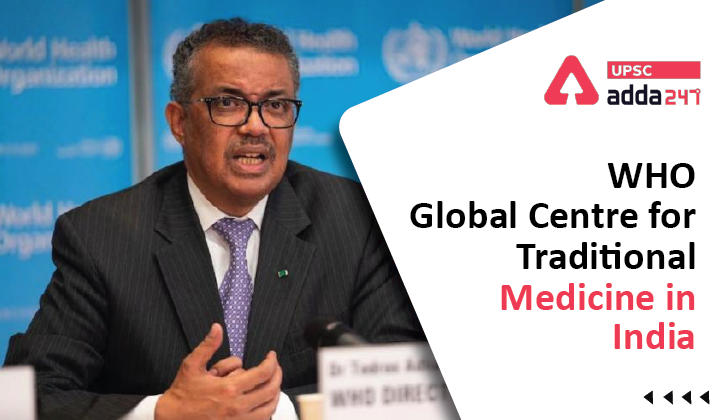Table of Contents
WHO Global Centre for Traditional Medicine- Relevance for UPSC Exam
- GS Paper 2: International Relations- Important International institutions, agencies and fora- their structure, mandate.
WHO Global Centre for Traditional Medicine in news
- Recently, the Union Cabinet has approved the establishment of the WHO Global Centre for Traditional Medicine (WHO GCTM) in Jamnagar, Gujarat.
- India signed a Host Country Agreement with the World Health Organization (WHO) for establishing WHO Global Centre for Traditional Medicine in India.
- WHO Global Centre for Traditional Medicine would be the first and only global outposted Centre (office) for traditional medicine across the globe.
Key Facts about WHO Global Centre for Traditional Medicine
- Key Role:
- The WHO GCTM would provide leadership on all global health matters related to traditional medicine.
- WHO Global Centre for Traditional Medicine will also extend support to member countries in shaping various policies related to traditional medicine research, practices and public health.
- Parent Ministry: WHO Global Centre for Traditional Medicine will be established in Jamnagar under the Ministry of AYUSH.
- Significance: The upcoming WHO- GCTM and various other initiatives in collaboration with WHO will aid India in positioning traditional medicine across the globe.
WHO Global Air Quality Guidelines 2021-Impact on health and key changes
Key Benefits of WHO Global Centre for Traditional Medicine
Establishment of WHO Global Centre for Traditional Medicine in India led-
- To position AYUSH systems across the globe
- To provide leadership on global health matters pertaining to traditional medicine.
- To ensure quality, safety and efficacy, accessibility and rational use of traditional medicine.
- To develop norms, standards, and guidelines in relevant technical areas, tools and methodologies, for collecting data undertaking analytics, and assessing impact.
- Envisage WHO TM Informatics centre creating a collaboration of existing TM Data banks, virtual libraries, and academic and research institutes.
- To develop specific capacity building and training programmes in the areas of relevance to the objectives and conduct training programmes in campus, residential, or web-based, and through partnerships with the WHO Academy and other strategic partners.
National Ayush Mission (NAM) | National Ayush Mission Scheme
National Ayush Mission (NAM) | National Ayush Mission Scheme





 TSPSC Group 1 Question Paper 2024, Downl...
TSPSC Group 1 Question Paper 2024, Downl...
 TSPSC Group 1 Answer key 2024 Out, Downl...
TSPSC Group 1 Answer key 2024 Out, Downl...
 UPSC Prelims 2024 Question Paper, Downlo...
UPSC Prelims 2024 Question Paper, Downlo...
